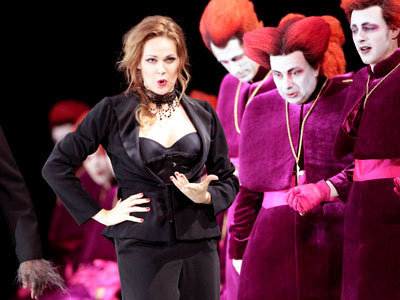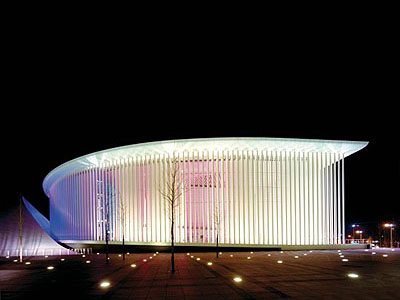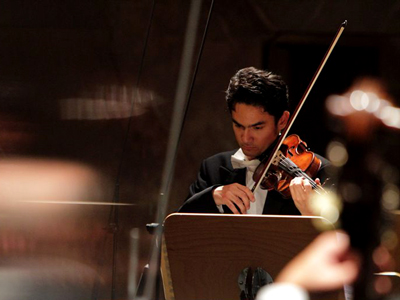
By ANDREW POWELL
Published: December 11, 2014
MUNICH — Puccini lost even before the curtain went up Nov. 15 on Hans Neuenfels’ conceptual new staging of Manon Lescaut for Bavarian State Opera. Anna Netrebko, its titular star, abandoned the project in quiet disgust, understandably it turned out. Disaster did not follow, but the night and the subsequent run will long be remembered for what might have been, musically.
The company broke the sorry news Nov. 3 after securing a substitute in Kristine Opolais. It cited “unterschiedlichen Auffassungen,” divergent opinions, between star and director and lamely lamented the stresses of theater life. It had not, apparently, considered managing those stresses so that no cast change was needed. In any case, the neat explanation rang hollow: Netrebko has a history of flexibility with Regietheater. She had signed on with a régisseur known for strange concepts and was no doubt looking forward to the highly visible introduction to Germany of a successful new role.
Sure enough, a more accurate picture emerged within days, in Der Spiegel and from the horse’s mouth. While the Russian soprano remained atypically mute, Neuenfels, 73, echoed the conversation in rehearsals that caused the rift. Netrebko had conveyed views about the choice facing Abbé Prévost’s 1731 material girl — between a life of passion with penniless des Grieux and one of wealth with Geronte — that he, Neuenfels, found “lächerlich und degradierend,” laughable and degrading, to women. He had reasoned back: “Möglicherweise findet man es in Russland als Frau gar nicht schlimm, sich von einem alten, reichen Mann aushalten zu lassen,” or, Maybe in Russia it is not considered at all bad for a woman to let herself be kept by an old rich man — this, not incidentally, to an actress whose own family endured deprivation and hunger at the start of her career. Bottom line: your views are no good, and probably because you are Russian. Bravo, Herr Direktor!
The cast change would not have mattered so much had Netrebko not triumphed in February in her role debut as Puccini’s Manon, and before an Italian audience under Riccardo Muti’s strict tutelage. But she had. Tapes demonstrate she was red hot for this role this year, with clear Italian, a dramatic command of the evolving character gleaned from years as Massenet’s protagonist, and, especially, rich tones to wield in all sorts of expressive ways.
Opolais has sung here often since her radiant first appearance in 2010 in a lyrically conducted (Tomáš Hanus), perversely staged (Martin Kušej) Rusalka, not always equaling that achievement. She is an enchanting presence on stage, an excellent musician, a game and cooperative colleague. The voice never makes an ugly sound, but it wanes in volume as it descends (there is no “chest voice” of substance), and her Italian wants stronger consonant projection.
On opening night Opolais (pictured) teamed magnetically with her des Grieux, Jonas Kaufmann. Both gave their best in Act IV, she singing to the boards for heft in Sola, perduta, he sailing high as a generous embodiment of Gallic desperation. Throughout Act II, alas, the soprano’s relatively monochromatic voice and missing gravitas limited the music: a little morbidezza helps in the singing of In quelle trine morbide, and Tu, tu, amore! Tu? at the start of the duet requires intensity and volume. Markus Eiche, as the immoral Lescaut, sounded glorious but strove in vain for italianità. Ditto for Sören Eckhoff’s loosely regimented choristers. Vivid supporting contributions came from Okka von der Damerau, a vocally lush Musico; Dean Power, a spright Edmondo; and the veterans Ulrich Reß, cast inexplicably as a hypertrichotic Maestro di ballo (hand is pictured, lower left), and Roland Bracht, a credible and clear Geronte.
The Bavarian State Orchestra showed astonishing sensitivity to Puccini’s freshest score, finely tracing its melodic ideas, scampering through the momentary ironies, deftly tinting the myriad and occasionally peculiar textures. It was an evening of great acumen and discernment for the brass, notably the trombone group, where an oversized cimbasso provided discreet assistance. Everything came across new and instant as propelled by Alain Altinoglu, Munich’s first master Puccinian in many seasons.
Neuenfels’ staging, which returns next July and will be streamed, advances the action to “Irgendwann,” whenever. It is black, framed in white neon. Its black-clad protagonists emote under seldom-varied white light. Stripped of time and place, the French cautionary tale is spun with the aid of projected texts auf Deutsch, plugging holes the director perceives in the Italian libretto and injecting wisdom and whimsy, little of it profound or funny. Early example: “‘When a coach comes, the opera begins,’ said Giacomo Puccini.” Neuenfels uses the choristers — Act I’s students, Act II’s guests, the gawkers at Le Havre — to toy around more invasively, mockingly, endowing them with flame-red hair to ensure we watch.
The action is closely calibrated to shifts in the score, but the rootless and sterile settings, combined with Neuenfels’ propensity to play with paraphernalia and gags of his own invention, send the opera down a path that is at odds with the brutal application of law and the personal destruction driving the music. Result: a diminished dramma mitigated somewhat by a powerfully bare Act IV.
It is intriguing to contemplate how much of this production would still have worked had its director been fired last month after offending Netrebko. Chances are, all of it. One imagines a late but efficient Bavarian State Opera team scramble to prepare for opening night without Neuenfels, mounting Manon Lescaut with the planned and more gifted soprano. In business, it would have been that way, and one wonders why a public theater is any different. Instead the company’s management allowed hurtful on-the-job remarks to deprive Munich, and the world, of what would certainly have been a momentous series of performances. Prima il regista, poi la musica.
Photo © Wilfried Hösl
Related posts:
Verdi’s Lady Netrebko
Blacher Channels Maupassant
Portraits For a Theater
Petrenko’s Sharper Boris
Mélisande as Hotel Clerk







Manon, Let’s Go
Thursday, December 11th, 2014By ANDREW POWELL
Published: December 11, 2014
MUNICH — Puccini lost even before the curtain went up Nov. 15 on Hans Neuenfels’ conceptual new staging of Manon Lescaut for Bavarian State Opera. Anna Netrebko, its titular star, abandoned the project in quiet disgust, understandably it turned out. Disaster did not follow, but the night and the subsequent run will long be remembered for what might have been, musically.
The company broke the sorry news Nov. 3 after securing a substitute in Kristine Opolais. It cited “unterschiedlichen Auffassungen,” divergent opinions, between star and director and lamely lamented the stresses of theater life. It had not, apparently, considered managing those stresses so that no cast change was needed. In any case, the neat explanation rang hollow: Netrebko has a history of flexibility with Regietheater. She had signed on with a régisseur known for strange concepts and was no doubt looking forward to the highly visible introduction to Germany of a successful new role.
Sure enough, a more accurate picture emerged within days, in Der Spiegel and from the horse’s mouth. While the Russian soprano remained atypically mute, Neuenfels, 73, echoed the conversation in rehearsals that caused the rift. Netrebko had conveyed views about the choice facing Abbé Prévost’s 1731 material girl — between a life of passion with penniless des Grieux and one of wealth with Geronte — that he, Neuenfels, found “lächerlich und degradierend,” laughable and degrading, to women. He had reasoned back: “Möglicherweise findet man es in Russland als Frau gar nicht schlimm, sich von einem alten, reichen Mann aushalten zu lassen,” or, Maybe in Russia it is not considered at all bad for a woman to let herself be kept by an old rich man — this, not incidentally, to an actress whose own family endured deprivation and hunger at the start of her career. Bottom line: your views are no good, and probably because you are Russian. Bravo, Herr Direktor!
The cast change would not have mattered so much had Netrebko not triumphed in February in her role debut as Puccini’s Manon, and before an Italian audience under Riccardo Muti’s strict tutelage. But she had. Tapes demonstrate she was red hot for this role this year, with clear Italian, a dramatic command of the evolving character gleaned from years as Massenet’s protagonist, and, especially, rich tones to wield in all sorts of expressive ways.
Opolais has sung here often since her radiant first appearance in 2010 in a lyrically conducted (Tomáš Hanus), perversely staged (Martin Kušej) Rusalka, not always equaling that achievement. She is an enchanting presence on stage, an excellent musician, a game and cooperative colleague. The voice never makes an ugly sound, but it wanes in volume as it descends (there is no “chest voice” of substance), and her Italian wants stronger consonant projection.
On opening night Opolais (pictured) teamed magnetically with her des Grieux, Jonas Kaufmann. Both gave their best in Act IV, she singing to the boards for heft in Sola, perduta, he sailing high as a generous embodiment of Gallic desperation. Throughout Act II, alas, the soprano’s relatively monochromatic voice and missing gravitas limited the music: a little morbidezza helps in the singing of In quelle trine morbide, and Tu, tu, amore! Tu? at the start of the duet requires intensity and volume. Markus Eiche, as the immoral Lescaut, sounded glorious but strove in vain for italianità. Ditto for Sören Eckhoff’s loosely regimented choristers. Vivid supporting contributions came from Okka von der Damerau, a vocally lush Musico; Dean Power, a spright Edmondo; and the veterans Ulrich Reß, cast inexplicably as a hypertrichotic Maestro di ballo (hand is pictured, lower left), and Roland Bracht, a credible and clear Geronte.
The Bavarian State Orchestra showed astonishing sensitivity to Puccini’s freshest score, finely tracing its melodic ideas, scampering through the momentary ironies, deftly tinting the myriad and occasionally peculiar textures. It was an evening of great acumen and discernment for the brass, notably the trombone group, where an oversized cimbasso provided discreet assistance. Everything came across new and instant as propelled by Alain Altinoglu, Munich’s first master Puccinian in many seasons.
Neuenfels’ staging, which returns next July and will be streamed, advances the action to “Irgendwann,” whenever. It is black, framed in white neon. Its black-clad protagonists emote under seldom-varied white light. Stripped of time and place, the French cautionary tale is spun with the aid of projected texts auf Deutsch, plugging holes the director perceives in the Italian libretto and injecting wisdom and whimsy, little of it profound or funny. Early example: “‘When a coach comes, the opera begins,’ said Giacomo Puccini.” Neuenfels uses the choristers — Act I’s students, Act II’s guests, the gawkers at Le Havre — to toy around more invasively, mockingly, endowing them with flame-red hair to ensure we watch.
The action is closely calibrated to shifts in the score, but the rootless and sterile settings, combined with Neuenfels’ propensity to play with paraphernalia and gags of his own invention, send the opera down a path that is at odds with the brutal application of law and the personal destruction driving the music. Result: a diminished dramma mitigated somewhat by a powerfully bare Act IV.
It is intriguing to contemplate how much of this production would still have worked had its director been fired last month after offending Netrebko. Chances are, all of it. One imagines a late but efficient Bavarian State Opera team scramble to prepare for opening night without Neuenfels, mounting Manon Lescaut with the planned and more gifted soprano. In business, it would have been that way, and one wonders why a public theater is any different. Instead the company’s management allowed hurtful on-the-job remarks to deprive Munich, and the world, of what would certainly have been a momentous series of performances. Prima il regista, poi la musica.
Photo © Wilfried Hösl
Related posts:
Verdi’s Lady Netrebko
Blacher Channels Maupassant
Portraits For a Theater
Petrenko’s Sharper Boris
Mélisande as Hotel Clerk
Tags:Abbé Prévost, Alain Altinoglu, Bavarian State Opera, Bavarian State Orchestra, Bayerische Staatsoper, Bayerischer Staatsopernchor, Bayerisches Staatsorchester, Commentary, Dean Power, Der Spiegel, Giacomo Puccini, Hans Neuenfels, Kaufmann, Kristine Opolais, Manon Lescaut, Markus Eiche, München, Munich, Netrebko, Okka von der Damerau, Review, Roland Bracht, Ulrich Reß
Posted in Munich Times | Comments Closed